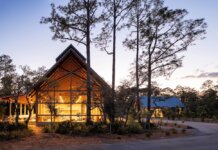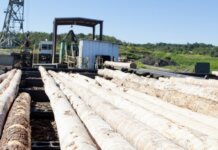
ABOVE Jeff Joyce, manager of Georgia-Pacific’s Brewton mill, where the company has just completed more than $400 million in upgrades. Photos by Mike Kittrell
Georgia-Pacific describes the Alabama forest products recovery as “slow and steady.” But after five years and $1.2 billion in investments and acquisitions, slow and steady is fast and ready. For in Alabama, the Atlanta-based wood products giant can see the forest for the trees.
It wasn’t easy. Enduring an economic collapse fueled by a housing bubble burst never is easy. But Georgia-Pacific refused to shelter in place.
“We had a downturn, ” recalls Rod Chandler, plant manager of Georgia-Pacific’s Composite Panel site in Monroe-ville. “We make industrial particle board products for kitchen cabinets, offices, shelving, bathrooms and other uses. But when building construction slowed down, we did too, running at reduced schedules and making hard decisions. But we made it through and learned to be more frugal with money, resources.”
Yet 35 miles away, Georgia-Pacific Pulp and Paper Mill of Brewton, saw little change. “Brewton has a diverse line of paper products, not directly affected by housing construction, ” says Mill General Manager Jeff Joyce. The site produces solid bleached sulfate (SBS), containerboard, premium brand folding carton grades and carded packaging ranging from pizza boxes to Dixie cups. Joyce adds, “We saw some effects but nothing like the lumber business side.”
In 2006, 2.2 million new houses were being built nationally. By 2009, the number was less than 500, 000. The housing market collapsed and the lumber business splintered.
“People just stopped building, ” recalls Jeff Koeppel, senior vice president of operations. “It had a ripple effect. No construction meant no sales.” Koeppel adds, “If you are not building houses you don’t need lumber and you don’t need wallboard.”
But Koeppel notes that Georgia-Pacific faced the downturn with heads up. “The industry restructured quite a bit, ” he recalls. “Some businesses shut down, waiting until the economy recovered, but we continued to invest. It made our sites more efficient. Now that the market is back, we are a lot more competitive.”
Georgia-Pacific provides 2, 300 jobs in seven facilities spanning Alabama from top to bottom. An additional 100 employees will be hired for a new lumber mill in Talladega set for completion later this year. Currently the Atlanta-based giant adds $216 million to the state in direct employee payroll and benefits.
Represented in 30 states, Georgia-Pacific’s Alabama entries rank in the company’s top five for employment. Everything the company makes, from paper pulp to paper plates, is made in Alabama from one or more of the company’s Alabama facilities.

ABOVE Brewton’s recently completed $388 million recovery boiler tower.
Bleach board, container board – Brewton
Standing about 13 stories above Brewton, Georgia-Pacific’s recovery boiler system, “Power Island” is a sight to behold. It self-generates energy using natural gas and biofuel residuals from the papermaking process. In addition to the modernized equipment, the mill’s new turbine provides Brewton with the capacity to grow its production capabilities. At any single moment, operating at full capacity, the turbine can produce enough electricity to power the equivalent of 60, 000 homes.
“It was a big investment — $388 million, ” notes Jeff Joyce, Brewton Mill manager, acknowledging one of the tallest structures in Escambia County. “We were disadvantaged in our energy cost structure. Without a major investment we would not be competitive.”
Brewton’s plant also brought online a $50 million paperboard project. “We rebuilt our Number 2 paper machine, brought it online, and had sellable product the day after startup, ” notes Joyce.

ABOVE Construction in progress at the Talladega site where G-P is investing $100 million on a new lumber production facility.
Photo courtesy of Georgia-Pacific
Lumber Mill – Talladega
“I am amazed at the progress made at this site, ” says Fritz Mason, vice president and general manager of Georgia-Pacific Lumber, about the company’s latest investment upstate. In September 2017, the company announced a $100 million lumber production facility, the site of a former plywood mill. Target startup date is third quarter 2018.
“Talladega is a great location for us, ” Mason adds. “It offers good proximity to customers, an excellent local workforce and a good raw material supply of logs.”
Startup plans forecast approximately 150 incoming log trucks a day, producing 230 million board feet annually. At capacity production, the plant is expected to produce some 300 million board feet annually.
Alabama River Cellulose – Monroeville
In 2015, Georgia-Pacific announced plans for a $100 million upgrade to its Alabama River Cellulose (ARC) mill. The project affected two wood yards, replacing one and upgrading the other. ARC also added a major renovation to one of the mill’s pulp producing machines. The plant employs about 440 people and manufactures products for several arenas, including the wood pulp/fluff pulp market’s demand for baby diapers.
Other Monroeville area sites include the Composite Panels site and Rocky Creek Lumber mill, acquired in 2015.

ABOVE G-P employee Jimmy McKinley takes a new roll of paper off the paper machine.
Naheola Paper – Pennington
Another investment, $120 million for Georgia-Pacific’s Naheola mill in Pennington (near Demopolis), was announced in September 2017. The upgrade introduces new technology to the mill’s tissue converting lines, where bulk tissue paper is transformed into consumer-sized rolls and prepared for shipment. In addition, Naheola makes the base stock for paper cups and plates.
Corrugated plant – Huntsville
G-P’s Huntsville plant manufactures corrugated boxes for customers, including internal ones like Brewton’s mill.
Sawmill – Belk
The Georgia-Pacific Sawmill in Belk, near Fayette, makes dimensional lumber for the housing market.
But investing in an improving economy is more than money, greater than innovations, and stronger than machinery. People make it happen. Their skills are an investment.
“Changes are coming to the world, and it is taking place in our operations, too, ” notes Koeppel. “We continue automating with digital technology, and we need to develop skillsets for a workforce to do work differently — less manual labor and more technology. We are investing in that and the workforce to handle it.”
Just as people rely on cellphones, sawmills rely on the internet and broadband. Koeppel believes more investment is needed in broadband for rural areas, where wood and paper mills typically operate.
But humans run the computers. Employees push the buttons. The industry is adapting buzz saws to iPads.
Fritz Mason notes that today’s mill work, which used to require heavy lifting and manual cutting, is done by workers interfacing with electronic notebooks, entering commands on a computer that are implemented on a southern pine.
Technology is changing the business, the way it is run and the people needed. Koeppel adds, “We need to work with community colleges, vocational and tech schools, and universities to make sure employees are ready for that technology.”
But despite economic downturns, raw materials never wavered. Trees still grow. According to the Alabama Department of Commerce, the state has the second largest timberland base in the U.S., with nearly 23 million acres.
Emmett Burnett and Mike Kittrell are freelance contributors to Business Alabama.



